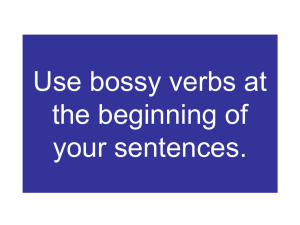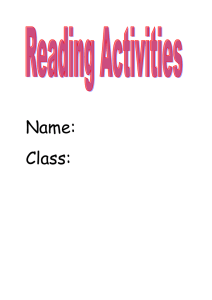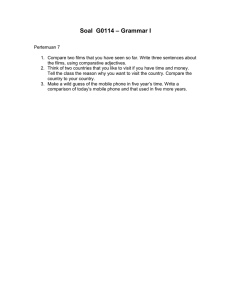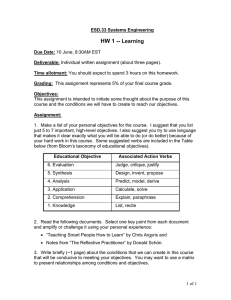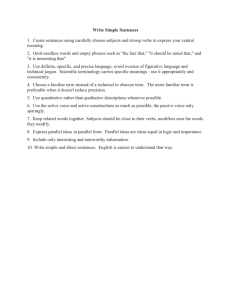Classroom observation feedback Instruction Objective:
advertisement
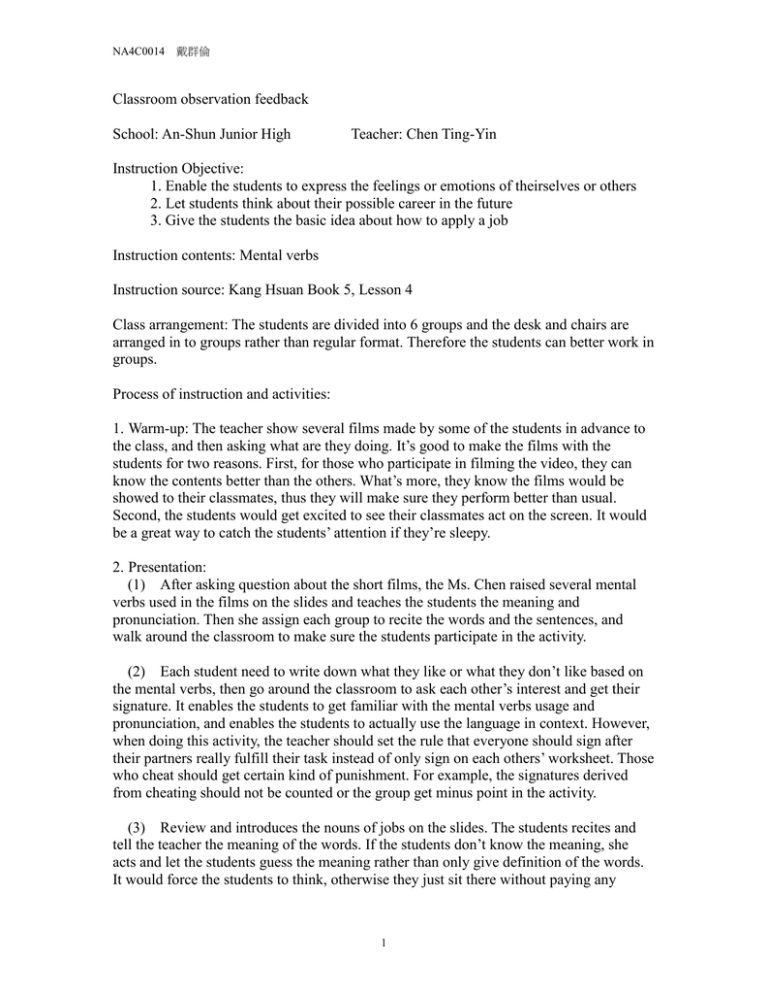
NA4C0014 戴群倫 Classroom observation feedback School: An-Shun Junior High Teacher: Chen Ting-Yin Instruction Objective: 1. Enable the students to express the feelings or emotions of theirselves or others 2. Let students think about their possible career in the future 3. Give the students the basic idea about how to apply a job Instruction contents: Mental verbs Instruction source: Kang Hsuan Book 5, Lesson 4 Class arrangement: The students are divided into 6 groups and the desk and chairs are arranged in to groups rather than regular format. Therefore the students can better work in groups. Process of instruction and activities: 1. Warm-up: The teacher show several films made by some of the students in advance to the class, and then asking what are they doing. It’s good to make the films with the students for two reasons. First, for those who participate in filming the video, they can know the contents better than the others. What’s more, they know the films would be showed to their classmates, thus they will make sure they perform better than usual. Second, the students would get excited to see their classmates act on the screen. It would be a great way to catch the students’ attention if they’re sleepy. 2. Presentation: (1) After asking question about the short films, the Ms. Chen raised several mental verbs used in the films on the slides and teaches the students the meaning and pronunciation. Then she assign each group to recite the words and the sentences, and walk around the classroom to make sure the students participate in the activity. (2) Each student need to write down what they like or what they don’t like based on the mental verbs, then go around the classroom to ask each other’s interest and get their signature. It enables the students to get familiar with the mental verbs usage and pronunciation, and enables the students to actually use the language in context. However, when doing this activity, the teacher should set the rule that everyone should sign after their partners really fulfill their task instead of only sign on each others’ worksheet. Those who cheat should get certain kind of punishment. For example, the signatures derived from cheating should not be counted or the group get minus point in the activity. (3) Review and introduces the nouns of jobs on the slides. The students recites and tell the teacher the meaning of the words. If the students don’t know the meaning, she acts and let the students guess the meaning rather than only give definition of the words. It would force the students to think, otherwise they just sit there without paying any 1 NA4C0014 戴群倫 attention. Then The next task began: Combine the mental verb and the nouns of occupation to form sentences, introduce to each other the job they like and dislike, and get each others’ signature. (4) After the students get familiar with the sentence pattern, each group will come to the stage and draw a sentence which is already scrambled. The other groups have to descramble the sentences and recite. It will enable the students to think and get familiar with the sentence pattern more. (5) Introduce the basic format of a reseme, discuss about the problems people might face when they want to apply a job and have an interview or meeting. (6) Review the mental verbs and sentence pattern. Assignment and homework: (1) The students will have a quiz the next time. (2) Discuss about a role play in a job interview setting. To sum up: 1. Ms. Chen spend lots of time preparing the slides of the lesson. It would be time consuming if she does it at first, but the material would come in handy when she teaches the same lesson in the future. Thought using the slides provided by the publisher might will be a more easier way to handle the lesson, the self-made material can better suit our needs and be close to the students. 2. The lessons are based on tasks, instead of direct method and grammar translating method. Therefore the students can do meaningful practice rather than bring drilling. It also takes lots of time for the teachers to come up with different embedded issues in the formal curriculum. 2

